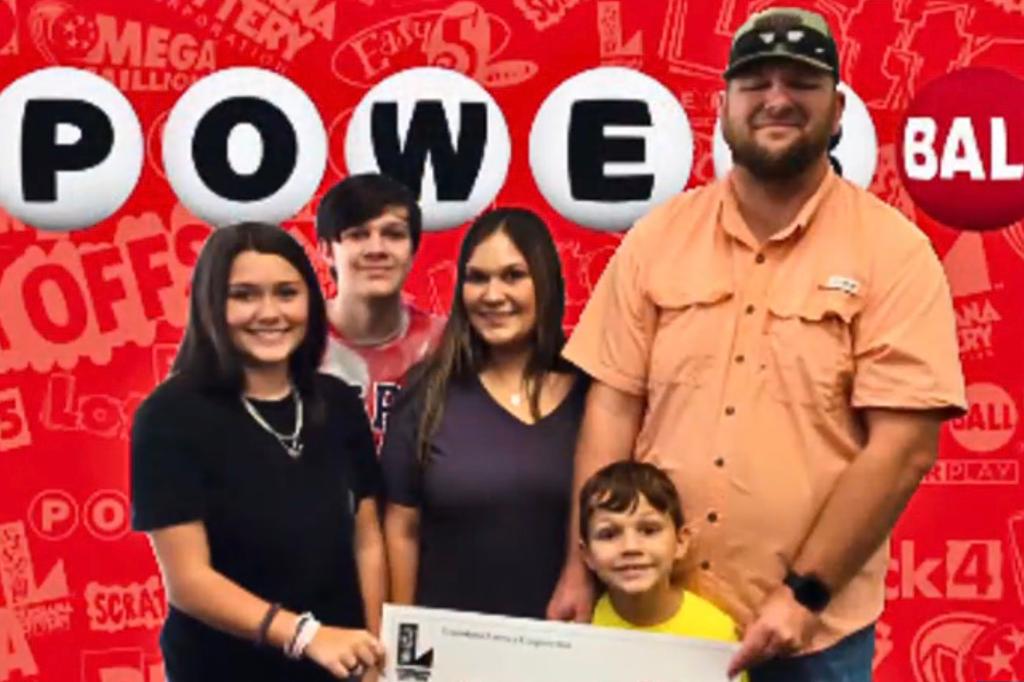Nearly Winning a Billion-Dollar Dream: The Stokes Family’s Powerball Journey
In the small town of Deridder, Louisiana, an ordinary Monday turned extraordinary for the Stokes family when they came tantalizingly close to changing their lives forever. John Stokes purchased what would become a fateful Powerball ticket at a local store called Billie’s Wag-A-Bag, not knowing that this simple transaction would lead to an emotional rollercoaster. As the Powerball jackpot had climbed to a staggering $1.1 billion, anticipation across the country was at fever pitch. That evening, the Stokes family gathered around to check their numbers—a ritual millions of Americans perform with equal parts hope and resignation. When they realized they had matched four of the five white ball numbers plus the crucial red Powerball, the initial disappointment of missing the grand prize by just one number quickly transformed into jubilation. Thanks to John’s decision to add the “Power Play” option, what would have been a $50,000 win tripled to $150,000—a considerable consolation prize that left the family feeling “shocked and blessed,” as John later expressed when claiming their winnings.
The Stokes family’s near-miss highlights the peculiar emotional territory that lottery players inhabit—a space where coming up short can still result in life-changing money. For most Americans, $150,000 represents several years of salary, enough to pay off debts, fund education, make home improvements, or create financial security that might have seemed out of reach. Yet in the context of the lottery, it’s framed as a consolation, a runner-up prize dwarfed by the colossal jackpot that remained unclaimed. This paradox encapsulates the lottery’s unique psychology: the Stokes family won more money in a single night than many people see in years, yet their story is presented as one of “almost” rather than achievement. Still, their gracious response—focusing on feeling blessed rather than dwelling on what might have been—reveals a healthy perspective on their windfall, an attitude that financial advisors consistently recommend for lottery winners of any amount.
Meanwhile, the broader Powerball saga continued its dramatic arc as both Monday’s $1.1 billion jackpot and Wednesday’s even larger $1.44 billion drawing went unclaimed, propelling the prize to an estimated $1.7 billion for Saturday’s drawing. This astronomical figure approaches the all-time record of $2.04 billion set in 2022, creating renewed media attention and driving ticket sales ever higher. The odds remain astronomically against any individual ticket—approximately 1 in 292 million—yet the public’s fascination with these mega-jackpots persists, perhaps because they represent one of the few pathways, however improbable, to instant wealth available to ordinary citizens. While the main prize continues to elude players, substantial secondary prizes have been awarded: Wednesday’s drawing alone created four $2 million winners through the “Match 5 + Power Play” combination and eleven $1 million winners who matched all five white balls without the Powerball.
The growing jackpot presents an interesting mathematical and financial proposition for potential winners. Should someone finally match all numbers in Saturday’s drawing, they would face a significant decision: accept a reduced lump sum payment of approximately $770.3 million (before taxes substantially reduce this figure further) or opt for the full jackpot value distributed through an immediate payment followed by 29 annual installments that increase by 5% each year. This choice involves complex considerations about investment opportunities, tax implications, personal financial security, and even mortality. Financial advisors generally recommend the annuity option for winners who might struggle with sudden wealth management, while those with investment expertise might prefer the lump sum. Either way, the winner would join an extremely exclusive club of lottery multimillionaires whose lives have been transformed overnight.
The current Powerball jackpot’s remarkable growth results from an unusually long streak without a winner—no one has claimed the top prize since May 31st, allowing nearly five months of rollovers. Each drawing without a winner adds to the jackpot’s value, creating a virtuous cycle for lottery administrators: larger jackpots generate more media coverage, which drives higher ticket sales, which in turn creates even larger jackpots when no one wins. This phenomenon explains why lottery organizations redesigned their games in recent years to make the top prizes harder to win but more spectacular when they are eventually claimed. For players, this means longer odds but bigger dreams; for state lottery commissions, it means more reliable revenue streams that fund education, infrastructure, and other public programs that benefit from lottery proceeds.
As Saturday’s drawing approaches, millions of Americans like the Stokes family will purchase tickets, each hoping to defy the overwhelming odds. Most will win nothing, some will win small prizes, a fortunate few will win life-changing amounts like the Stokes family did, and possibly one ticket holder will claim a place in financial history with the $1.7 billion jackpot. This collective national ritual—equal parts entertainment, financial speculation, and communal dreaming—continues to captivate the public imagination despite the mathematical reality that purchasing a ticket is, statistically speaking, almost equivalent to not purchasing one at all. Yet in this space between certainty and possibility, between rational analysis and emotional hope, the lottery finds its enduring appeal. For the Stokes family, that appeal has already paid a handsome dividend, even if they came up one number short of the billion-dollar dream.


